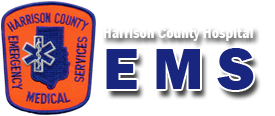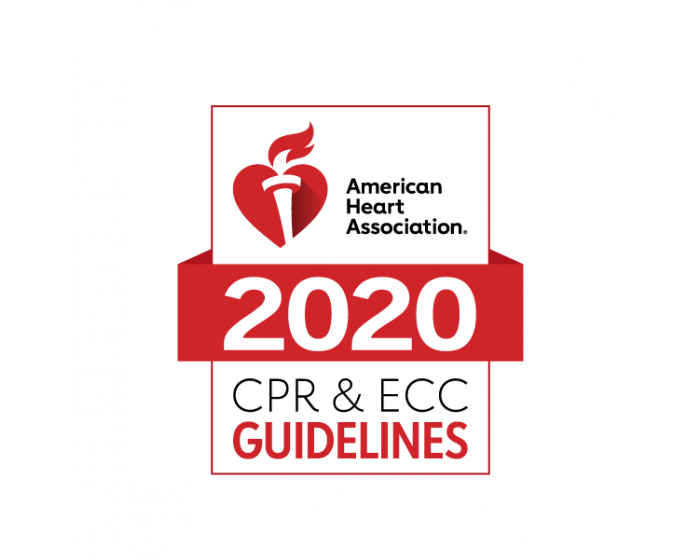

American Heart Association courses are designed for the general public, industry, business and healthcare professionals. All these courses come with provider manuals or workbooks and a course completion card. Call us today to find out how we can help you.
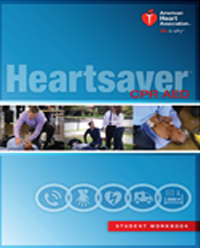
Heartsaver courses are intended for anyone with little or no medical training who needs a course completion card for job, regulatory (e.g., OSHA), or other requirements. These courses can also be taken by anyone who wants to be prepared for an emergency in any setting.
Course Length
-
3 to 4 hours
Course Description
AHA’s Heartsaver CPR, AED course provides the knowledge and skills that may help save a life. Although much is being done to prevent death from heart problems, cardiac arrest is still one of the leading causes of death in the United States. The skills learned in the course will help you recognize cardiac arrest, get emergency care on the way quickly, and help the person until more advanced care arrives to take over.
The Course Covers
- Adult CPR and AED use
- Opiod-associated life-threatening emergencies
- Adult Choking
- Child CPR and AED use
- Child Choking
- Infant CPR
- Infant Choking
Course Length
-
About 3 hours
Course Description
AHA's Heartsaver First Aid course provides the knowledge and skills that may help save a life. It offers the basics of first aid, consisting of the most common life-threatening emergencies, how to recognize them, how to call for help, and how to perform lifesaving skills. The most important goal of this course is to teach students to act in an emergency.
The Course Covers
- First Aid basics (duties, roles, responsibilities of first aid rescuers, key steps of first aid)
- Medical Emergencies (breathing, choking, allergic reaction, heart attack, stroke, and more)
- Injury Emergencies (external and internal bleeding, wounds, sprains, broken bones, burns, and more)
- Environmental Emergencies (bites and stings, cold and heat related emergencies, poisonings, and more)
- Preventing Illness and Injury
Course Length
- 5 to 6 hours
Course Description
AHA's Heartsaver First Aid, CPR, AED course provides the knowledge and skills that may help save a life. It also offers the basics of first aid for the most common life-threatening emergencies, covering how to recognize them, how to call for help, and how to perform lifesaving skills.
The Course Covers
- Adult CPR and AED use
- Opiod-associated life-threatening emergencies
- Child CPR and AED use
- Infant CPR
- First Aid basics
- Choking in an adult, child or infant
Course Length
- 3 hours
Course Description
The Heartsaver Pediatric First Aid, CPR, AED course is designed to meet the training needs of childcare providers in almost all U.S. States while also being a comprehensive resource for parents, grandparents, teachers, babysitters, foster care workers, camp counselors, coaches or anyone responsible for the safety of children.
The Course Covers
- Pediatric First Aid basics (bleeding/bandaging, allergic reactions, use of epinephrine autoinjectors, bites, stings, drowning, burns, asthma and more)
- Child CPR and AED use
- Child and Infant Choking
- Adult CPR and AED use (optional)
- Adult Choking (optional)
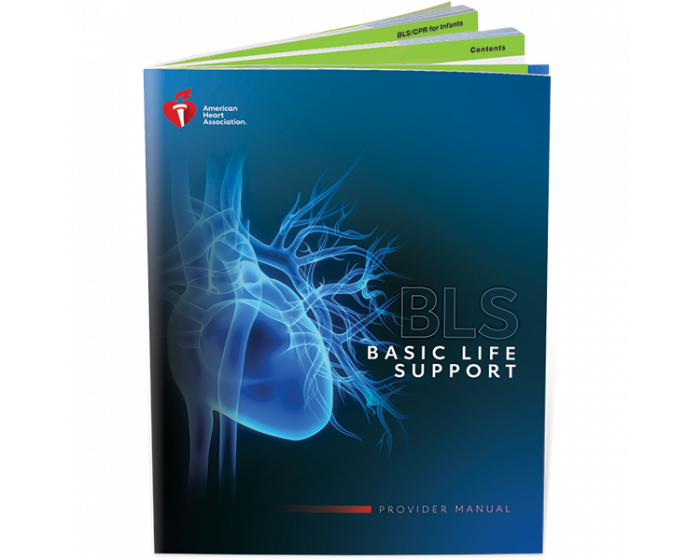
Course Length
- 4 hours
Course Description
Basic Life Support (BLS), formerly Healthcare Provider BLS, from the AHA offers the advantages of content representing the latest resuscitation science for improved patient outcomes, realistic scenarios, simulations and animations depicting rescuers, teams and patients. The course is designed for healthcare professionals and other personnel who need to know how to perform CPR and other basic cardiovascular life support skills in a wide variety of in-facility and prehospitial settings.
The Course Covers
- New science and education from the 2020 AHA Guidelines
- Components of high-quality CPR for adults, children and infants
- The AHA chain of survival
- Early use of an AED
- The importance of teams in resuscitation
- Relief of foreign body airway obstruction in adults and infants
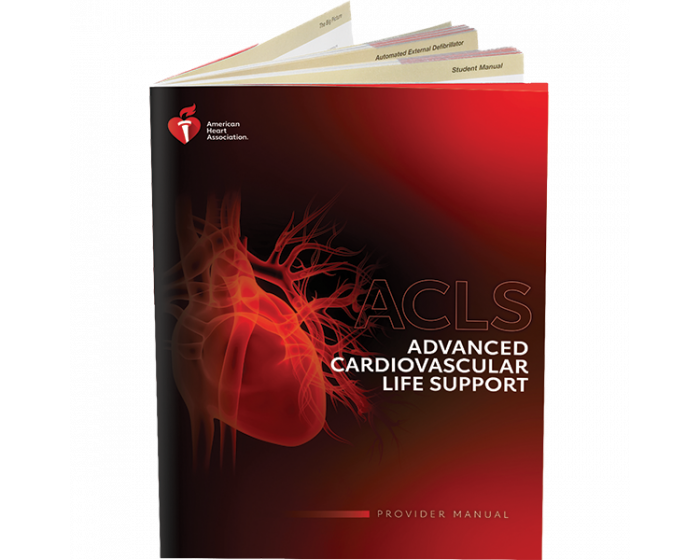
Course Length
- Full Course: 12 hours
- Renewal Course: 8 hours
Course Description
ACLS highlights the importance of high-performance team dynamics and communication, systems of care, recognition and intervention of cardiopulmonary arrest, immediate post-cardiac arrest, acute dysrhythmia, stroke, and acute coronary syndrome (ACS). The course is designed for healthcare professionals who either direct or participate in the management of cardiopulmonary arrest or other cardiovascular emergencies. This includes personnel in emergency response, emergency medicine, intensive care, and critical care units such as physicians, paramedics and nurses.
The Course Covers
- Basic life support skills, including high-quality chest compressions, use of a bag-mask device, and use of an AED
- Recognition and early management of respiratory and cardiac arrest
- Recognition and early management of peri-arrest conditions such as symptomatic bradycardia
- Airway management
- Related pharmacology
- Management of ACS and stroke
- Effective communication as a member and leader of a resuscitation team
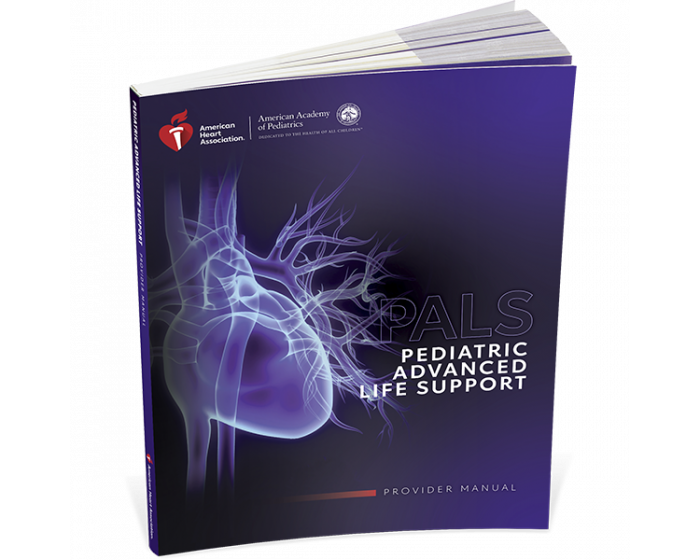
Course Length
- Full Course: 16 hours
- Renewal Course: 8 hours
Course Description
In the AHA's advanced pediatric course, students learn how to use a systematic approach to quickly assess, identify the underlying cause, and treat pediatric patients in emergency situations. Students interact with real pediatric patient cases, realistic simulations, and animations to assess and treat these pediatric patients. This includes applying basic life support, following PALS treatment algorithms, and practicing effective resuscitation skills and team dynamics. Through a combination of cognitive learning and psychomotor skills practice, the PALS course improves students' confidence and skill levels for delivering effective emergency pediatric care. The course is designed for healthcare providers who either direct or participate in the management of respiratory and/or cardiovascular emergencies and cardiopulmonary arrest in pediatric patients. This includes personnel in emergency response, emergency medicine, intensive care and critical care units such as physicians, paramedics, nurses and respiratory therapists.
The Course Covers
- The systematic approach to assess and treat seriously ill or injured infant/child
- Recognition and management of cardiac arrest
- Basic child and infant life support skills
- Effective resuscitation team dynamics
- Recognition and management of respiratory distress and failure, including airway management
- Recognition and management of shock, including vascular access
- Recognition and management of arrhythmias, including electrical therapy
- Post-cardiac arrest care
